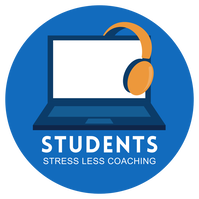Welcome to the blog
The Students Stress Less Coaching blog has a wealth of FREE resources, ranging in topics from executive function skills to exam prep. Enjoy.
Why "winging it" in college does not work but having some kind of daily operating system does!3/8/2024 One of the standard questions I have come to ask struggling college students over the years is, "Do you feel like you are just winging it?". When they hear words that describe their exact challenge, most responses I get are, "Exactly." Most college students who struggle with executing and completing tasks, managing emotions associated with not executing and completing, and planning, prioritizing, and organizing operate in no-man's land the majority of their existence in college. There is no planning system, no calendar system, no study system, no self-management system, and no progress measurement system. They just “wing it.” In coaching, we assess the connection between not having daily habits, routines, and systems and feeling like they are "just winging it." We acknowledge the causality of students occupying most of their time and space in what I now affectionately call "no man's land" – the space where direction, purpose, plan, and action is nonexistent- and extreme stress. There is a direct relationship. So, how can a struggling college student set up a system for success – one that helps move them through time and space, is effective managing stress, and promises academic success? A productive self-management system in college that ensures academic and personal success consists of these 6 micro-systems: 1. Campus learning management system - examples of this are Canvas and Blackboard. Students need to be proficient in utilizing their campus learning systems. This is habit #1 upon entering college. 2. A study and scheduling system - there is no exact science in creating your system other than it needs to help you move through your day with productivity and purpose. The creation, execution, and adherence of this system will determine your academic success. This system is the antidote to "winging it". 3. Executive functioning (skills) - the ability to manage yourself through your day at college and get all of the things done that need to be done hinges upon how solid this set of cognitive processing skills is. The frontal lobes of the brain direct you through life with capabilities like making decisions, reasoning, managing impulses, paying attention, solving problems, planning, self-monitoring, self-regulating, initiating and completing tasks, and self-directing behaviors. When these capabilities are not being utilized, thriving in college is a daily challenge. 4. Stress and anxiety management skills - some stress in college is necessary because it's the eustress that helps your rise to the occasion to get things done on time, to manage -it-all, and to produce and perform. However, it is what you do and how you regulate the overload of heavy feelings, overwhelm, and stress that will determine your movement through the chaos. This ability to self-manage and move through hard emotions is something most students have not had to practice upon entering college. The ability to use positive and healthy coping skills when the going gets tough in college is one of the main factors that will build resilience so you can get up, brush off, and try again. 5. Wellness habits -the ability to balance work and play- this is difficult for most adults; however, when college students learn and practice how to prioritize, organize, apply effort, and take breaks this affords them time and energy to find joy and happiness such as engaging in passions, hobbies, utilizing nature and physical fitness, and connecting in positive ways with like-minded humans (volunteering). Wellness in college is about energy balance – input and output - assessing where, how, and with whom energies are being used and absorbed. This flow of energy is more than a determinant of a student's overall personal and academic success. It determines mental health, illness, and even disease when it is stuck or stagnant. 6. Healthy habits- habits are the foundation of routines, and routine is the basis for daily success (again, the antidote for winging it). Most college students do not realize that having routines relieves the brain of decision-making up to 50% every day. The brain saves energy with habits - harvesting it for times when decisions are needed for higher orders of thinking like problem solving, using logic and reason, organization, and planning, analyzing, and critical thinking. Establishing healthy habits and habits that create ease and flow without stress are essential for overall success in college. Share this with a college student you know who struggles to thrive in the chaos of college. Follow on Instagram @collegestresscoach. Categories All
0 Comments
Leave a Reply. |
|
